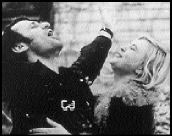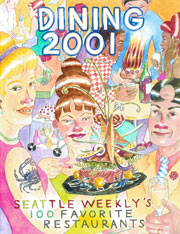Last week I passed the six-month mark leading up to age 30, that annus horribilis. And until last week, I had plans. I called my close women friends from college who live all over the country, and suggested that we meet at an airport hotel for some boisterous slumber-party action; I pictured lots of cocktails, greasy room service, and pay-per-view, with an option to wreak havoc in the pool. Their responses were mixed, if not unenthusiastic. Puzzled, but not ready to give in to the black balloons, I made a list of things to make my solo arrival in my fourth decade worth the trip:
*Buy a cell phone (because grown-ups shouldn’t be more than 15 minutes late meeting people, and if they are they should call en route)
*Buy a bottle of Chanel No. 5 (the perfume of the mature, sophisticated, everything-I’m-not-quite-yet-but-strive-to-be woman)
*Make myself a gourmet meal, complete with edible food and candlelight (pre-birthday cooking class?)
*Have a huge party (no. 3 backup plan)
Facing 30
by Lauren Dockett and Kristin Beck (New Harbinger, $12.95)
“I’m 30.” I was looking forward to reaching an age I never imagined I’d get to tell people. I’d be a grown-up. I assumed, of course, this emergence will reveal itself physically, that I will wake up next May 11 and be a redhead when I looked in the mirror, or suddenly freckle-free. Turning 30 isn’t supposed to bring on an onslaught of regret. After all, my wise friend Susie, who crosses over on December 15 (12 days!) retorted just a few days ago, “Middle-aged? No way, that’s 40 at least.”
But the angst has set in with the reading of a new book by two newly turned 30-year-olds, Lauren Dockett and Kristin Beck, friends who decided that being 30 was so debilitating that they had to interview all their friends and commiserate. The result is Facing 30, a self-help manual that illuminates the stages of denial, depression, and the inevitable downward spiral that comes when you suddenly find yourself with a “3” at the front of your age instead of a “2” and your achievements to date don’t amount to squat.
Perhaps the fear of aging is somehow connected to the hype around the approaching millennium; those of us who look forward to that next decade in the next couple of years are also combating anxiety about a milestone associated with Armageddon—so I suppose Dockett and Beck have a point in writing about “before” and “after.” They assiduously ascribe their own symptoms of 30-year-old worthlessness to the fact that hitting Y30 is a complete letdown. We’ve been building up to it for some time, they point out in the chapter “Facing 30 Freak-Out,” citing psychoanalysts and other specialists who refer to the disorder as “Age 30 Transition.”
Dockett and Beck also point out that feelings of “It’s downhill from here,” “I wasted the best years of my life,” and the one that hit home the most, “I’m not ever going to be famous” are not only expected, they’re part of a period of self-examination long overdue. “For those of us who thought optimistically of 30 when we were younger, the big day was going to be a celebration of a time when our lives made sense,” they write. “A time when we’d benefit from both the freedom and the stability of adulthood. Once we were 30, we’d have realized all our desires and be living in a state of contentment. . . . We freak out because we never expected to be [30] or because it just isn’t what we’d hoped or because we’re convinced it will be every bit as bad as we’d imagined. We freak out because we haven’t updated our expectations . . . and they still echo in our heads like dire warnings. . . . “
Facing 30 reads like a consolation for being stuck in a category that no one else could understand, let alone avoid. Geared toward Gen-Xers who decided, back in their formative, free-wheelin’ twenties, that the mainstream wasn’t the way to go, the authors’ interviewees have pursued odd jobs and single parenthood, the arts and alternative lifestyles. They generally agree that 30 is not only a time for taking more responsibility for time having passed, it’s also a chance to return to old dreams and discard them once and for all.
I’m suspicious, and not just a little annoyed. Should I have realized that I was subscribing to celebrity magazines, as the authors claim, because I thought I’d be able to flip through them and see myself? Or that I was buying the office baby gifts when I really wanted to be pushing a stroller with my own little bundle of joy in it? While Dockett, Beck, and their buddies are serious when they say that this is a period of reckoning, one thing still consoles me as I hurtle through space/time toward menopause: I’m likely to get carded well into the millennium.








